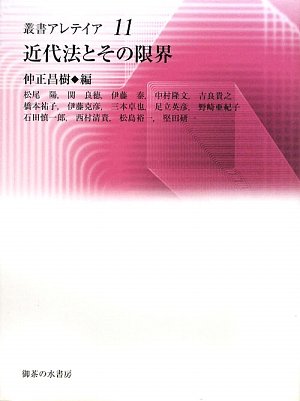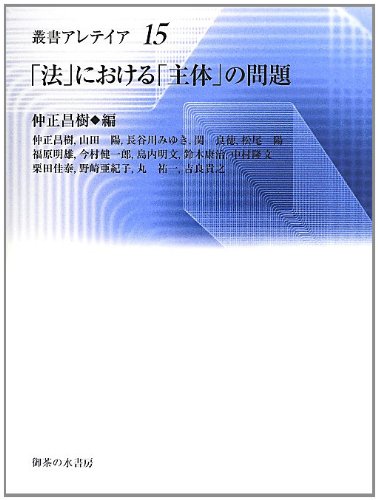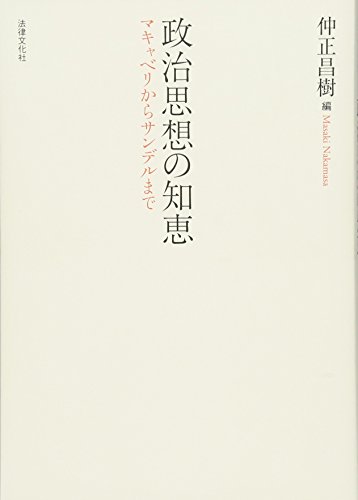7 0 0 0 IR 「公共性」と「共通感覚」 : ハンナ・アーレントの「政治=演劇」モデルをめぐって
- 著者
- 仲正 昌樹
- 出版者
- 金沢大学
- 雑誌
- 金沢法学 (ISSN:0451324X)
- 巻号頁・発行日
- vol.44, no.2, pp.173-227, 2002-03
- 著者
- 仲正 昌樹
- 出版者
- 金沢大学法学部 = The Faculty of Law, University of Kanazawa
- 雑誌
- 金沢法学 (ISSN:0451324X)
- 巻号頁・発行日
- vol.45, no.1, pp.27-89, 2002-11
3 0 0 0 IR カント政治哲学における<法>と<共同体>
- 著者
- 仲正 昌樹
- 出版者
- 金沢大学
- 雑誌
- 金沢法学 (ISSN:0451324X)
- 巻号頁・発行日
- vol.44, no.1, pp.11-61, 2001-11
2 0 0 0 OA 「連邦補償法」から「補償財団」へ : ドイツの戦後補償の法的枠組みの変化をめぐって
- 著者
- 仲正 昌樹
- 出版者
- 金沢大学法学部 = The Faculty of Law, University of Kanazawa
- 雑誌
- 金沢法学 = Kanazawa law review (ISSN:0451324X)
- 巻号頁・発行日
- vol.43, no.3, pp.89-136, 2001-03-31
2 0 0 0 IR ルーマンの法社会学における<法>と<正義>
- 著者
- 仲正 昌樹
- 出版者
- 金沢大学
- 雑誌
- 金沢法学 (ISSN:0451324X)
- 巻号頁・発行日
- vol.42, no.1, pp.99-137, 1999-12
- 著者
- ヒンチマン ルイス ヒンチマン サンドラ 仲正 昌樹
- 出版者
- 情況出版
- 雑誌
- 情況 第二期
- 巻号頁・発行日
- vol.11, no.4, pp.67-82, 2000-05
- 著者
- 仲正 昌樹
- 出版者
- 金沢大学法学部 = The Faculty of Law, University of Kanazawa
- 雑誌
- 金沢法学 = Kanazawa law review (ISSN:0451324X)
- 巻号頁・発行日
- vol.41, no.1, pp.1-37, 1996-12-28
1 0 0 0 OA フリードリッヒ・シュレーゲルの詩学における祖国的転回
- 著者
- 仲正 昌樹
- 出版者
- 日本独文学会
- 雑誌
- Neue Beiträge zur Germanistik (ISSN:24330906)
- 巻号頁・発行日
- vol.110, pp.97-110, 2003 (Released:2018-03-31)
1 0 0 0 OA 「公共性」と「共通感覚」 : ハンナ・アーレントの「政治=演劇」モデルをめぐって
- 著者
- 仲正 昌樹
- 出版者
- 金沢大学法学部 = The Faculty of Law, University of Kanazawa
- 雑誌
- 金沢法学 = Kanazawa law review (ISSN:0451324X)
- 巻号頁・発行日
- vol.44, no.2, pp.173-227, 2002-03-25
1 0 0 0 OA 半外部の視点から見た法学教育
- 著者
- 仲正 昌樹
- 出版者
- 日本法哲学会
- 雑誌
- 法哲学年報 (ISSN:03872890)
- 巻号頁・発行日
- vol.2006, pp.44-56,267, 2007-10-30 (Released:2010-12-16)
I will present my personal view on legal education from the perspective of a semi-outsider, namely as the one, who did not study law as a student but is working actually as a professor in the faculty of law. The legal education in the faculty of law of Japanese universities has a very particular tradition, which was established in the imperial universities before the World War II. The objectives of the legal education in those imperial universities were to raise up legal elites who should play important roles in lawmaking process and lead the legal practice. However, as the number of law students increased drastically and the roles of the academics and the practi-tioners were separated after the war, the meaning of the legal education changed as well. Nevertheless, the professors of the faculty of law have been persisting in the traditional elite education system, which are causing enormous difficulties for normal students. There are standardized styles of textbooks, in which the key notions of the codes are exactly defined and explicated in the lexical order and accordingly the exemplary cases are introduced. Seemingly, students are supposed to learn the ideally constructed law system rather than actual legal conflicts. Professors of the faculty of law have been insisting this sort of systematized education would help students gain the comprehensive view of the living law. But this argument has been getting invalid since the introduction of the Law School system. The students who really want to be lawyers are studying at law schools, in which different methods of education are adopted. Then, what are the objectives of the legal education in the remaining faculty of law? Is it still necessary to present concurring academic doctrines in the textbooks, although most of students are not willing to be jurists? I propose that students of the faculty of law should learn more of actual legal conflicts from the perspective of a ‹client›. It often happens that jurists will not respond to the requests of their clients, suggesting difficulties of actual cases. Sometimes sentences of the court deviate from the literal interpretation of the written code. It should be useful to learn such ambiguities and irregularities of law practice that every citizen may face when they seriously seek the course of justice. There should be classes of legal communication from the viewpoint of clients in the curriculum of the faculty of law.
- 著者
- 仲正 昌樹
- 出版者
- MXエンターテインメント
- 雑誌
- 表現者criterion = Espressivo : 第Ⅱ期 : 「危機」と対峙する保守思想誌
- 巻号頁・発行日
- no.1, pp.76-83, 2018-03
1 0 0 0 「法」における「主体」の問題
- 著者
- 仲正昌樹編 仲正昌樹 [ほか著]
- 出版者
- 御茶の水書房
- 巻号頁・発行日
- 2013
1 0 0 0 IR 「連邦補償法」から「補償財団」へ--ドイツの戦後補償の法的枠組みの変化をめぐって
- 著者
- 仲正 昌樹
- 出版者
- 金沢大学法学部 = The Faculty of Law, University of Kanazawa
- 雑誌
- 金沢法学 (ISSN:0451324X)
- 巻号頁・発行日
- vol.43, no.3, pp.89-136, 2001-03




